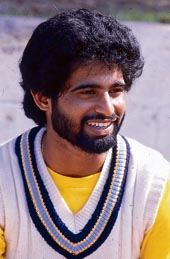 |
| Chetan Sharma |
1987
If 1983 World Cup saw the end of the West Indies domination, the 1987 edition heralded the emergence of Australia in world cricket. Reigning champions India started as the favourites. But they soon got a reality check from the hands of Australians who sneaked in a one-run victory over the world champions to give the tournament a rousing start in Madras (now Chennai) on October 9, 1987. More upsets and nail-biting finishes were in store, when England scored 35 off their last three overs to beat runners-up West Indies by two wickets; and when the gallant amateurs of Zimbabwe lost by only three runs to New Zealand.
 |
| Geoff Marsh |
Barring the one-odd loss, India began their campaign in the World Cup brightly as they went on to top Group A (Australia, New Zealand and Zimbabwe being the other teams) with five wins and one loss. India, by the way, lacked the likes of its past World Cup heroes Mohinder Amarnath and Madan Lal, though the side was still led by Kapil Dev and featured an ageing Sunil Gavaskar.
In fact Gavaskar, having hit his first and only ODI century against New Zealand, and averaging 50 in the tournament, made his last international appearance fittingly at his home ground in Bombay (now Mumbai). Playing in his fourth World Cup, Viv Richards, too, aptly called it a day after scoring a tournament-record 181 against Sri Lanka.
The two-time champions, just for the record, could not make the last-four this time, even as they annihilated Sri Lanka by 191 runs after scoring a record 360 for four in the group-stage. India and Australia entered semis from Group A, while Pakistan and England stood out from the West Indies and Sri Lanka to make the cut from Group B.
The India-Australia match saw Navjot Singh Sidhu and Tom Moody making their ODI debuts for their respective team. Sidhu finished the tournament averaging 55, while Moody had just five.
On his debut, Sidhu made 73 as India cruised to 207 for two. But his dismissal brought in a batting collapse as India lost their last eight wickets for just 62 to fall one-run short of Australia (270). Continuing his good form, Sidhu made a well-timed 75 off 71 balls against New Zealand, which took India to 252. India eventually pulled of a 16-run victory with some tidy bowling from Ravi Shastri and Mohammed Azharuddin.
It was smooth sailing for India in the rest of the group stage, getting past Zimbabwe (by eight wickets), Australia (56 runs) and then again Zimbabwe (seven wickets). India sealed up the group stage with a comprehensive nine-wicket win over New Zealand, with Gavaskar scoring 103 not out. Chetan Sharma recorded the first hattrick of the World Cup.
His victims were Ken Rutherford, Ian Smith and Ewan Chatfield.
 |
As it turned out, the Nagpur win on October 31 happened to be their last win in the Cup.
In their semi-final encounter at the Wankhede, the home script went terribly awry as England avenged their 1983 World Cup loss, with a 35-run win. Put into bat, England notched 254 for six. But India were shunted out of contention as their ‘famed’ batting line-up of K. Srikkanth, Gavaskar, and Sidhu failed. A valiant 64 from Mohammed Azharuddin was of no use as they were bowled out inside 46 overs.
Meanwhile, propelled by Craig McDermott’s five for 35 (tournament’s best figure), Australia snatched an 18-run victory. In fact, McDermott became the leading wicket-takers, equalling the World Cup record of 18 and Imran Khan capturing 17 in one match less.
The semi-final results shattered the hopes of millions of fans who had eagerly awaited for a mouth-watering India-Pakistan final.
The final saw Australia’s march to world domination. Powered by Geoff Marsh and David Boon’s 52 in the first 10 overs, Australia made 253 for five. Boon top-scored with 75. With Mike Gatting in command, the target seemed reachable until the captain reverse-swept Allan Border’s first ball. Taking a top-edge, bouncing off the shoulder, Gatting was snapped up by Greg Dyer behind the stumps. England were struggling from then, as they managed 246 — falling short by seven runs, the narrowest in any of the four World Cup finals so far.
England proved second time unlucky as Australia lifted the Reliance World Cup at Eden Gardens on November 8.











